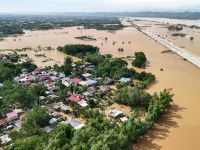The 22nd Gulf Cooperation Council summit opened on Sunday in Oman. Declarations by the leaders of the UAE and of Saudi Arabia indicates fundamental differences of opinion on how the council should react to the current world situation.
The pro-active position was taken up by the United Arab Emirates, when H.H. Sheikh Zayed bin Sultan al Nahyan, President of the UAE, called for a comprehensive review of the Arab position and an awareness of the seriousness of the challenges facing the Arab world today. He also noted that the leaders and the people of the Gulf have greater ambitions and aspirations to be fulfilled than what has been accomplished to date by the GCC.
In an interview to the Omani news agency, Sheikh Zayed stressed that these challenges needed to be confronted collectively, and added that the 22nd summit in Muscat reflected a desire to work together for the common good.
While Sheikh Zayed urged reassessment and immediate collective action, Saudi Arabia’s King Fahd took an opposite view. The King spoke about the risks resulting from misjudgment or the desire for dominance, and endorsed a policy of moderation. Although such a policy has less dramatic impact, it allows stability and steady growth. Moreover, it allows those achievements that have been reached to be retained.
A key issue that the GCC leaders will have to address in the summit is the call for greater integration among the Gulf nations. While Sheikh Zayed’s policy would seem to indicate accelerating the move towards a European-Union model of economic and political integration, King Fahd apparently would prefer a less binding framework, and pointed out the merits of developing economic relations on a country-to-country basis, with summit host Oman and the Kingdom of Saudi Arabia as examples for such relations.
With two opposing points of view from two key participants, it appears as though the outcome of the summit may be surprising. (www.albawaba.com)







